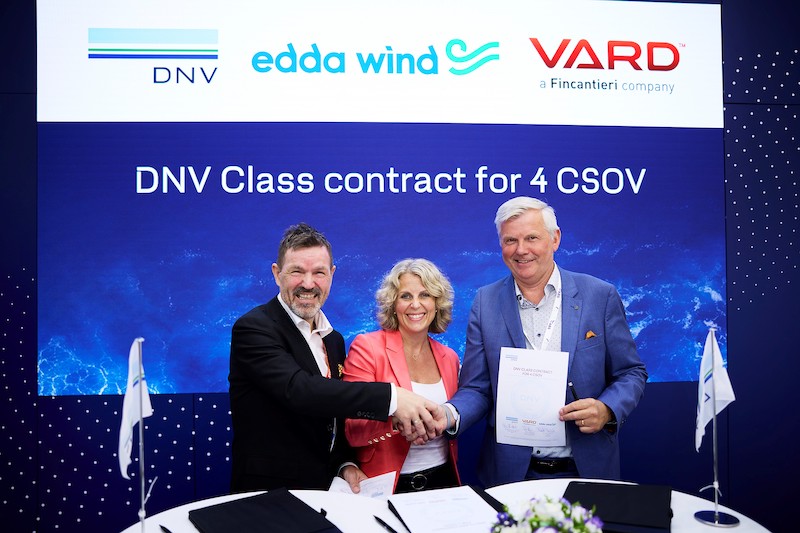At the Nor-Shipping trade fair, DNV signed a classification contract for four state-of-the-art Commissioning Service Operation Vessels (CSOVs), ordered by Norwegian offshore wind operator Edda Wind. Set to be delivered from Vard yards in Norway and Vietnam the vessels will provide essential support to the burgeoning offshore wind industry.
The CSOVs will serve as primary vessels for wind turbine technicians during commissioning and maintenance tasks, offering them support and a secure working environment. The vessels will be prepared for zero-emission operations based on a Liquid Organic Hydrogen Carrier (LOHC) concept in addition to being methanol ready.

“Together with Edda Wind and DNV we are now following up on our strategies to meet the world growing energy needs in a sustainable way, says Torgeir Haugan, SVP Sales & Marketing in VARD. "Smarter and more sustainable vessels are the top priority for all parties in this project. Together we will create a series of unique and sustainable vessels especially developed to meet the customer’s and regulation’s requirements and needs.”
“As the energy transition continues to ramp up, support vessels to enable the roll out of renewable offshore fixed and floating wind turbines will be essential,” said Tuva Flagstad-Andersen, Regional Manager, Region North Europe at DNV. “Vessels in this segment are highly specialised, must operate in demanding environments, while delivering operations safely, reliably, and sustainably. At DNV we are very pleased to be able to deepen our cooperation with Edda Wind and Vard and look forward to successful delivery of the vessels.”
Exclusively designed for Edda Wind by Vard in Ålesund Norway, two of the CSOVs are scheduled for delivery in Q1 2025 and will be delivered by one of Vard`s shipyards in Norway. The other two, scheduled for delivery in Q2 2025 and Q1 2026, will be built and delivered by Vard Vung Tau in Vietnam.
The vessels will feature Vard Electro's SeaQ Integrated Bridge System. Onboard the vessels, there are 101 cabins and common areas available to accommodate 120 persons. To ensure optimal working conditions, anti-heeling and roll reduction systems will be installed, and the vessels are equipped with motion-compensated gangway- and crane systems.








